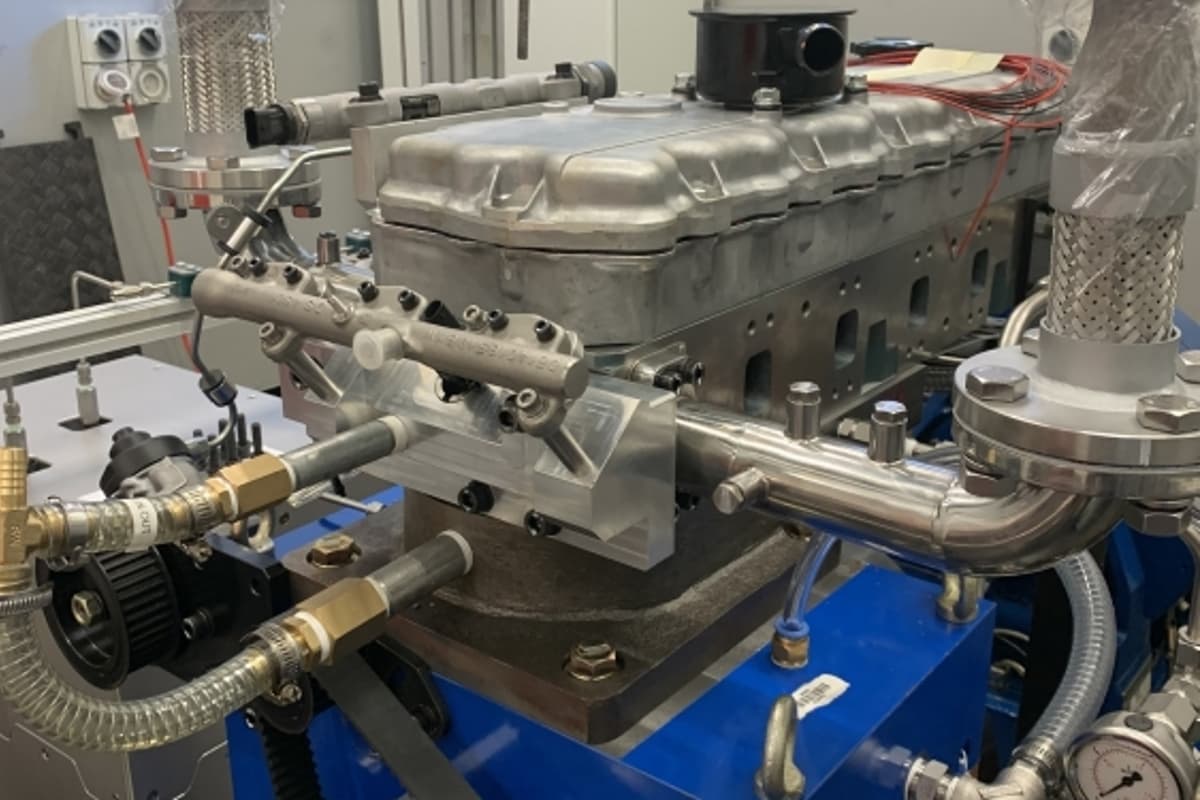Pudsey Bear
Full Member
- Messages
- 10,069
Curtesy of newatlas.com
October 13, 2022

Retrofitting existing diesel engines to run mainly on hydrogen may be a fast way for large fleets to rapidly reduce their carbon footprint without junking existing assets
Prof Shawn Kook / UNSW
VIEW 2 IMAGES
UNSW researchers have prototyped and tested a retrofit system that converts diesel engines to run on 90% hydrogen, radically reducing both carbon dioxide and nitrous oxide emissions while boosting efficiency by an impressive 26% in the process.
Running 10% diesel, the process is not a full green conversion for diesel engines, but it does offer a way for certain businesses to hugely reduce their emissions output without wastefully junking existing assets that could still remain useful for a long time.
The retrofit system keeps the diesel injection system, but adds hydrogen injection directly to the cylinder, as well as independent control of injection timing for both the hydrogen and diesel systems. It doesn't require particularly high-purity hydrogen, and the team has demonstrated that its "stratified" hydrogen injection technique, which creates pockets of higher and lower hydrogen concentrations in the cylinder, reduces the incidence of nitrous oxide emissions below that of a straight diesel.
The overall carbon dioxide emissions drop by some 85%, to around 90 grams/kWh of energy – that would certainly represent a solid intermediate step towards total decarbonization for many operations using large fleets of diesel vehicles.
Of course, it relies on hydrogen being available – which, in most areas, is not yet the case. But as the key green vehicle alternative to lithium batteries, hydrogen's time may be coming. Lithium supply shortages look set to rock the battery EV market in the coming few years, right when government regulations start kicking in to seriously accelerate the transition to zero-emissions driving in many jurisdictions. And green hydrogen projects are springing up all over the globe.
UNSW researchers Professor Shawn Kook (right), Xinyu Liu (back left) and Jinxin Yang (front left) with the diesel-to hydrogen retrofit test rig
Prof Shawn Kook / UNSW
Still, for the time being, the UNSW team is working to get its diesel engine retrofit systems commercialized within the next two years, and it's targeting industrial fleet and generator operators like mining operations, many of which already have hydrogen piped to the site. Again, this is currently unlikely to be green hydrogen, so the initial uses might effectively just be transferring their emissions to some Haber-Bosch plant down the street. But as the green hydrogen industry ramps up, it'll be important for investors to know there's reliable and growing demand from vehicles out there already using hydrogen and looking for a cleaner solution.
“We have shown that we can take those existing diesel engines and convert them into cleaner engines that burn hydrogen fuel," said Professor Shawn Kook, lead author on a paper just published in the International Journal of Hydrogen Energy. "Being able to retrofit diesel engines that are already out there is much quicker than waiting for the development of completely new fuel cell systems that might not be commercially available at a larger scale for at least a decade. With the problem of carbon emissions and climate change, we need some more immediate solutions to deal with the issue of these many diesel engines currently in use.”
For a lower-friction approach – albeit one with less impressive results – there are other retrofit systems being developed, like the HYDI direct injection device, which generates its own hydrogen as you drive, and injects it into the air-fuel mixture to help the diesel ignite faster and more completely. It requires nothing but an occasional water top-up, so it's completely non-reliant on hydrogen fuelling infrastructure, and it reduces fuel consumption by 5-13%, while also cutting down on emissions.
Retrofit system converts existing diesel engines to run on 90% hydrogen
By Loz BlainOctober 13, 2022

Retrofitting existing diesel engines to run mainly on hydrogen may be a fast way for large fleets to rapidly reduce their carbon footprint without junking existing assets
Prof Shawn Kook / UNSW
VIEW 2 IMAGES
UNSW researchers have prototyped and tested a retrofit system that converts diesel engines to run on 90% hydrogen, radically reducing both carbon dioxide and nitrous oxide emissions while boosting efficiency by an impressive 26% in the process.
Running 10% diesel, the process is not a full green conversion for diesel engines, but it does offer a way for certain businesses to hugely reduce their emissions output without wastefully junking existing assets that could still remain useful for a long time.
The retrofit system keeps the diesel injection system, but adds hydrogen injection directly to the cylinder, as well as independent control of injection timing for both the hydrogen and diesel systems. It doesn't require particularly high-purity hydrogen, and the team has demonstrated that its "stratified" hydrogen injection technique, which creates pockets of higher and lower hydrogen concentrations in the cylinder, reduces the incidence of nitrous oxide emissions below that of a straight diesel.
The overall carbon dioxide emissions drop by some 85%, to around 90 grams/kWh of energy – that would certainly represent a solid intermediate step towards total decarbonization for many operations using large fleets of diesel vehicles.
Of course, it relies on hydrogen being available – which, in most areas, is not yet the case. But as the key green vehicle alternative to lithium batteries, hydrogen's time may be coming. Lithium supply shortages look set to rock the battery EV market in the coming few years, right when government regulations start kicking in to seriously accelerate the transition to zero-emissions driving in many jurisdictions. And green hydrogen projects are springing up all over the globe.
UNSW researchers Professor Shawn Kook (right), Xinyu Liu (back left) and Jinxin Yang (front left) with the diesel-to hydrogen retrofit test rig
Prof Shawn Kook / UNSW
Still, for the time being, the UNSW team is working to get its diesel engine retrofit systems commercialized within the next two years, and it's targeting industrial fleet and generator operators like mining operations, many of which already have hydrogen piped to the site. Again, this is currently unlikely to be green hydrogen, so the initial uses might effectively just be transferring their emissions to some Haber-Bosch plant down the street. But as the green hydrogen industry ramps up, it'll be important for investors to know there's reliable and growing demand from vehicles out there already using hydrogen and looking for a cleaner solution.
“We have shown that we can take those existing diesel engines and convert them into cleaner engines that burn hydrogen fuel," said Professor Shawn Kook, lead author on a paper just published in the International Journal of Hydrogen Energy. "Being able to retrofit diesel engines that are already out there is much quicker than waiting for the development of completely new fuel cell systems that might not be commercially available at a larger scale for at least a decade. With the problem of carbon emissions and climate change, we need some more immediate solutions to deal with the issue of these many diesel engines currently in use.”
For a lower-friction approach – albeit one with less impressive results – there are other retrofit systems being developed, like the HYDI direct injection device, which generates its own hydrogen as you drive, and injects it into the air-fuel mixture to help the diesel ignite faster and more completely. It requires nothing but an occasional water top-up, so it's completely non-reliant on hydrogen fuelling infrastructure, and it reduces fuel consumption by 5-13%, while also cutting down on emissions.

